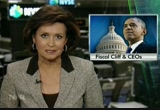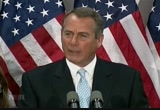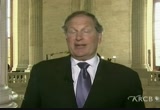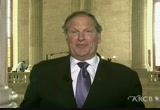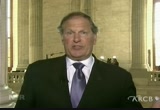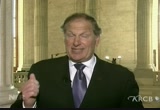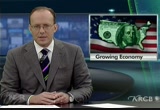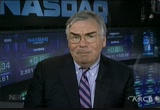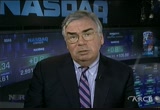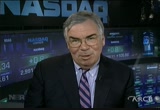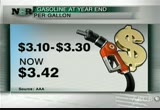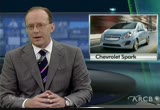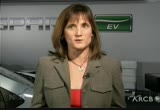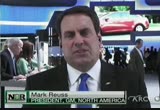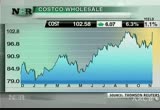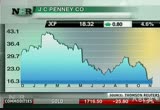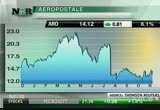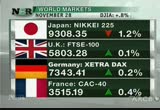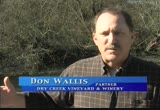tv Nightly Business Report PBS November 28, 2012 4:30pm-5:00pm PST
4:30 pm
captioning sponsored by wpbt >> this is n.b.r. >> susie: good evening, everyone. i'm susie gharib. from the white house to capitol hill, c.e.o.s from some of the nation's biggest companies met with the president and lawmakers, urging them to compromise on the fiscal cliff. we speak to honeywell's david cote.
4:31 pm
>> tom: i'm tom hudson. automakers go green. general motors' unveils its newest all-electric chevy spark. >> susie: and what would you do if you won powerball? some advice tonight on how to handle winning $550 million. >> tom: that and more tonight on "n.b.r." >> susie: a parade of business leaders in washington today to persuade president obama and congress to avoid the fiscal cliff. with just 33 days left to nail down a deal, c.e.o.s made the rounds to explain to lawmakers that because of cliff gridlock, they're holding back on hiring and spending. as darren gersh reports, c.e.o.s weren't the only ones campaigning hard today. >> reporter: the president and republicans focused today on staging events designed to pressure the other side. the president called on americans to tweet, facebook and call members of congress to tell them to pass tax cuts for everyone making less that $250,000 a year.
4:32 pm
>> 97% of small businesses would not see their income tax go up by a single dime. even the wealthiest americans would still get a tax cut on the first $250,000 of their income. >> reporter: the speaker dismissed a call from a fellow republican to give the president what he wants, saying it's not good economics to raise tax rates on small businesses. >> going over the fiscal cliff will hurt our economy and hurt job creation in our country. this is not good for our country. it's as simple as that, and the president understands it. >> reporter: corporate leaders were also making the rounds. a group from the simpson/bowles backed organization "fix the debt" stopped in for talks on capitol hill. and later, c.e.o.s from yahoo, archers daniel midlands, caterpillar and other companies headed to the white house for a meeting with the president. >> i'd like to hear the president's views about where the country is headed and support him any way we can. >> reporter: treasury secretary timothy geithner will meet with congressional leaders tomorrow, so there is hope serious face-
4:33 pm
to-face negotiations will soon be under way. darren gersh, "n.b.r.," washington. >> susie: one of the c.e.o.s meeting with lawmakers today joins us. he is david cote, c.e.o. of honeywell. david, thank you so much for joining us. we really appreciate it. did you get the sense from house speaker boehner, he is ready to make a deal? >> i would say there is a recognition on all sides about the significance and importance of a deal. it is a real question about gettin both sides en the room to actually hammer it out and get something done because we don't have a lot of time left. >> susie: president obama said he would like to have a deal by christmas. from what you heard today, how realistic is that? >> if they want to, they can get this done in a couple of days. it is just a matter of kind of working out some of these important details. but it's a matter, i think, they just need to get together and get started. i think both recognize the need for a market-credible $4 trillion deal, and it
4:34 pm
has got to comprise both tax increases that are believable and that will happen, and entitlement reform that is believable and will happen. both of those things will have to be an important rt of this. >> susie: did speaker boehner talk more specifically about what would be acceptable to his party? did he talk to you about that? >> i would say everybody did a pretty good job of being very careful about where things might stand and what it is they were accomplishing, which i'm hoping is a good sign they'll actually make something happen. but i'm pretty worried. i can say as a business leader, i'm pretty worried we could go off the fiscal cliff because both sides decide to push brinksmanship beyond the brink. >> susie: honeywell has a lot of defense contracts, and if you go over the fiscal cliff, one of the first areas that will be cut drastically is defense. how are you preparing for that possibility? >> we've been planning for
4:35 pm
a couple of years about defense reductions, because we thought that is one the things that is going to have to happen. just being on the simpson bowle commission, getting a sense of how bad things are. there is an impact that is occurring across the company, and i think across other companies, about this uncertainty, can i guy still governor. i really stopped external hiring about june. i was only hire back 100 or 200 a month, so we steadily worked our census down. that helps contribute to a roubled economy. >> susie: you don't feel the way that warren buffett does, who was saying that the fiscal cliff has nothing to do with his investment decisions. you're feeling much of of more of an impact on your day-to-day business? >> i'm looking more am i
4:36 pm
going to continue to grow outside of the u.s. or invest in my facilities in the u.s. in the main, that's still true, but you can't just act like everything is fine when it is not. and i don't know all of the details of his answer, but i can't imagine he said he is acting like nothing is going on out there. >> susie: so you talk about taxes, and taxes are at the center of all of these negotiations. are you open to new taxes? how would that impact your business? >> well, at the end of the day, we all recognize that we need entitlement reform in the country. that's actually the big nut. that's the thing that needs to happen. the only way you're going to get that, though, is by having some kind of tax increase.p4l&
4:37 pm
>> susie: well, i hope it all works out. thank you so much, david. we really appreciate your time. >> thank you, nice to be here. >> susie: we're speaking with david cote, c.e.o. of honeywell. >> tom: still to come, with the fiscal cliff fast approaching, more companies are offering special dividends with the threat of higher taxes next year. some optimistic talk today about the fiscal cliff gave the markets a lift, and so did some fresh economic reports. the federal reserve said the economy is growing at a steady pace. the central bank's beige book report out today showed small gains in hiring and consumer spending, but manufacturing activity slowed down. now, in a separate report, new home sales fell slightly in october, down just 0.3% compared to september and below expectations. the median home price was $237,700, lower than a month earlier. and investors were encouraged by news from spain about a deal to
4:38 pm
clean up its struggling banking sector. the dow gained 107 points, the nasdaq finished higher by 24, the s&p 500 was up 11. john manley is chief equity strategist at wells fargo advantage funds. >> tom: john, you just heard the c.e.o. at honeywell talk about the lack of real hiring plans, partly because of the fiscal cliff. does that concern you as a stock investor? >> it does. i mean, i think the one thing about being a stock investor, you sort of have to buy with uncertainty and sell on certainty. so it is an opportunity, but i'm not sure it is one that has fully unfolded yet. >> tom: so are you hearing what you want to hear regarding the fiscal cliff? >> no. because i shouldn't be hearing anything. i think when the real negotiations occur, when they really hammer it out, it won't be public. you can't really discuss this sort of thing in public. because if they are going to resolve it, promises will have to be fudged, at best, and that's not something you do right away. you sort of have to go
4:39 pm
through a process and this is the early stage of that process. >> tom: early stage, and yet five weeks left before we go over that fiscal cliff. and how can investors keep their eye on their investments when there is so much uncertainty. >> it is not even five weeks. i think investors tr to focus on the fundamentals of the funds they own. they have to focus on their positions and where things will be in the long-term. >> tom: if things go to the worse possible scenarios, we're talk be about two down quarters. and we're talking about something beyond that. there are some industries that are attractive, and there are some opportunity in the markets. if you're patient, if you're willing to sort of give away the first month or two, i think you can still do very well long-term. >> tom: name some names. what are some new ideas you will put new money to work? >> i prefer big rather than small believers and i prefer growth. the health care sector has don't well. i think we're later in the
4:40 pm
game. i think technology, which has been pummelled recently by what is going on in europe and what people are concerned about in the u.s. that cycle hasn't worked itself out. there is still a business re-up cycle. and finally energy. i think energy, whether it is big or small, is attractive at this point in time. the u.s. is fighting to have more available energy than we ever thought we had in the last 30 or 40 years. and i think that industry, as it develops, will be profitable for the people in it. >> tom: a little bit of optimism from the desk of wells fargo. john manley with wells fargo funds.
4:41 pm
>> susie: good news on gas prices: they're falling after spiking because of hurricane sandy. that's welcome relief to many drivers, but it still costs more to fill up your tank now compared to a year ago. erika miller reports from one of the most expensive cities to fill 'er up. >> reporter: here in new york city, the long lines and gas rationing are finally gone, but there's more good news. like the rest of the nation, gas is actually cheaper now than before superstorm sandy. a month ago, superstorm sandy shut down refineries in the northeast, delayed oil shipments and left many gasoline stations without power. in some hard hit areas, prices spiked more than ten cents a gallon. but now, the situation has drastically improved here and around the country. regular unleaded costs an average of $3.42 nationwide. that's 12 cents below where it was a month ago. but drivers are still paying about 12 cents more for gas today than a year ago.
4:42 pm
a big reason is escalating middle east tensions. >> anytime you have that kind of conflict in the middle east, whether it's the israelis or the egyptians, the syrians, it really the disruption of flow, you know. any time you get a problem in the gulf, it's really going to hinder oil prices. >> reporter: if the recent cease-fire between hamas and israel in the gaza strip holds, many thi prices at the pump will drift lower. it also helps that u.s. refineries are producing ample supplies of gasoline. a.a.a. expects regular unleaded to end the year between $3.10 and $3.30 a gallon. but longer term, the price of gasoline depends on the strength of the global economy. >> my outlook right now for gasoline prices is, we are going to continue to come off some more? the thing with gasoline, you can't shove it down people's throats. they just don't have the money for higher oil prices. hence, that's going to put a cap on it. >> reporter: with only about a month left, 2012 is expected to be the most expensive year for gasoline ever.
4:43 pm
americans are expected to spend about $12 billion more to fill up their tanks this year compared to last. erika miller, "n.b.r.," new york. >> susie: what determines gas prices? as erika just reported, there's more to it than supply and demand. to learn more about prices at the pump, visit our web site, www.nbr.com, and look for the "nbr-u" tab. >> tom: while gas prices remain over $3 a gallon, the auto industry continues its slow and steady climb next year out of one of the industry's worst slumps ever. that was the prediction today from g.m. north america president mark reuss at the los angeles auto show. g.m. unveiled its first all- electric plug-in at the show, and, as diane eastabrook tonight, the company hopes the spark can give the electric vehicle business the jolt it needs. >> reporter: the chevrolet spark e.v. will hit showrooms in california and oregon next summer. engineers are still testing the pure plug-in so general motors
4:44 pm
can't say yet how many miles the sub-compact will get on a single charge. what it can say is new technology will allow for faster charging. the spark won't be cheap. with tax incentives, the car's sticker price will be about $25,000, double the price of the gas-powered version. >> when you look at the functionality that this vehicle has and the range we offer-- which we believe is the top of its segment-- it is going to be extremely competitive from a price perspective. you're always going to pay more for an electric vehicle than you would for a traditional vehicle with a gas engine. >> reporter: general motors has placed a huge bet on electric vehicles, hoping they'll help the company reach the government's 50-mile per gallon corporate average fuel economy requirement in 2025. but so far, interest in e.v.s has been lukewarm. g.m. launched the electric hybrid volt nearly two years ago, but so far the company has sold only about 30,000 of the vehicles. analysts blame lower gas prices and not enough charging stations for weak demand, but they think
4:45 pm
that could change. >> it's just not something that the customers are demanding right now. but, you know, looking back over time when toyota came out with the prius, it was kind of like "who wanted a hybrid car?" and now prius is the largest player. i mean, they are now 50% generally of the hybrid market. >> reporter: g.m. north america president mark reuss says the company remains bullish on electric cars but is developing other technologies, as well. >> i think c.n.g., compressed natural gas, is a huge opportunity on an unleveraging of foreign oil piece of this, as well. and if you look at the shale that we have and the reserves that we have in the united states, and you look at the cost of mining those, it puts the cost of that about half the price of gasoline. >> reporter: g.m. says in time electric vehicles will become more affordable as battery technology improves and gets less expensive. diane eastabrook, "n.b.r.," chicago. >> tom: tomorrow, we'll have more on the auto industry with
4:46 pm
the outlook on the u.s. from the world's most profitable automaker, volkswagen. >> susie: more pressure on s.a.c. capital today on word that the u.s. government might bring civil fraud charges against the firm, one of the biggest hedge funds in the world. during a conference call with investors, the company said it has received a so-called wells notice from the securities and exchange commission, often the first step to formal charges. the move comes a week after a former portfolio manager was charged with running the most lucrative insider trading schemes. s.a.c.'s billionaire founder,
4:47 pm
steve cohen, told clients he is confident that he "acted appropriately." well, another big company today authorizing a special dividend in anticipation of higher taxes next year. now it's costco jumping on the dividend bandwagon as a way to beat some of the impact of the fiscal cliff fallout. the wholesale club operator announced a special dividend of $7 a share to investors. it will cost the fi an estimated $3 billion. >> susie: tom, investors like the news. cosco's shares rose more than 6%, or $6, and a gain of of%. >> tom: we've seen a list of companies providing these special dividends, and we'll have more reporting on that tomorrow. today, meantime, in our market focus, some encouragement from capitol hill in the white house over avoiding the fiscal cliff. and the major stock indices head higher.
4:48 pm
the s&p 500 began the session by moving lower, hitting its lowest level of the day in the first hour. it moved into the green for the session the same hour president obama said they may have a fiscal cliff deal by christmas. the index finished at its high of the day, up 0.8%. volume grew from yesterday's pace. 708 million shares traded on the big board, just over 1.7 billion on the nasdaq. it was the consumer sector that was the hottest, with discretionary stocks up 1.3%. the energy sector gained 1.1%. industrials gained 0.9%. retail stocks were on the buy list for traders and investors with stores appealing to a broad array of shoppers. moving higher, there was the sector leading gains of j.c. penney, rising 4.6%. volume was more than double with the stock bouncing off three year lows hit last week. the company has struggled to remake itself with fewer promotions. and then there's luxury goods company coach. it gained 4.4%. last week, the stock fell to a three-month low as it has trended lower since the spring. other consumer stocks rallying. v.f. corporation is the company behind brands like lee jeans and timberland shoes. shares jumped 4%. this is a one-month high. best buy gained another 3.6% as
4:49 pm
it rebounds off a decade low. the company continues to wait to see if its founder will make a buyout offer. as for teen clothing stores, a couple of different outlooks from american eagle and aeropostale. american eagle shot up 7.1% after a big jump in quarterly earnings. the company credits stronger sales and fewer promotional discounts, and it expects that mix to continue next year. but watch shares of aeropostale tomorrow. after closing up 6.1%, they lost that much and then some in extended hours trading. the company's third quarter earnis were stronger than expected but called its holiday outlook cautious. shares were trading about a dollar below this closing number. also, after the closing bell, a buyout in the retail technology field. n.c.r. makes software that runs cash registers and automatic teller machines. it has agreed to buy retalix, which makes software for grocery stores and restaurants. n.c.r. will spend $650 million in cash to buy retalix. shareholders would get $30 per share.
4:50 pm
rumors of the deal sent shares of retalix up 34.7% during the regular session, closing just shy of the buyout price. n.c.r. was down less than 1% but was up in extended hours trading. all five of the most actively traded exchange traded products were up, led by the nasdaq 100 tracking fund, up by 0.9%. and that's tonight's "market focus." >> tom: more than a half billion dollars, that's what the jackpot of tonight's multi-state lottery, known as
4:51 pm
powerball is up to. normally we don't report on such games of chance, but it is awfully hard to ignore a potential $550 million windfall. for people waiting in hours in minnesota, to dreaming in miami. >> i would take that $500 million, and i would only get $250 million, because i would have to pay you the taxes, it would put you in the 50% tax bracket. it means i would get $125 million, free and clear, which is my money. i would invest some of it in the stock market, donate some of it to the churches. >> i would take a lump sum. >> reporter: why would you take a lump sum? >> because i don't know how long i'm going to live. >> tom: we spoke with susan bradley, founder of the sudden money institute and a certified financial planner. susan, tha thanks for joining us. an inheritance or a lottery -- how do you make that decision between taking a lump sum or stretching out the
4:52 pm
payments. >> you take a lot of time before you get to that decision. it is certainly not your first decision. your first thing to do is change management. we do a triage to see what is most important, and we deal with urgent things first, that are really going to affect well-being. usually the lump sum versus payment is something that you can put off for at least a month or two. >> tom: are we culturally bias to take the money and run now, compared to wait a generation to collect? >> you know, i think that used to be the very strong bias until about 2008. and then there was a sense that the investment markets were not so safe. so some people tend to go more towards the payments. neither one is good or bad. they both have their complecomplexities. >> tom: one of the risks of the payments is you could outlive the payments, or you may die before you're able to collect all those payments? >>noth of them, you need to have somebody working with you that
4:53 pm
knows the planning of that. if you're young enough, a 30-year payment, you could outlive that. so you need to create a replacement plan. you spend half of the after tax money and save half the money. and the other is, if you happen to be hit by a bus, you may be leaving a nightmare of estate planning. >> tom: and it is not just lottery lump sums, but it can retirement and pension. the powerball, 42 states involved, odds of winning, one in 175 million. you have better than 200 times odds to get struck by lightning. do you buy a ticket? >> i don't buy a ticket. randomly i buy my father's football numbers because that is important to him. but, no, i didn't. >> tom: you know sudden wealth like nobody else. thank you, susan. susan bradley, the fowptd of -- founder of the sudden money new hampshire.
4:54 pm
institute. >> susie: and coming up tomorrow on "n.b.r.": we talk to the stars of the precious metals industry. from gold to platinum, we'll get the outlook for metals in 2013. also tomorrow, the latest numbers on weekly jobless claims and chain store sales. and that's "nightly business report" for wednesday, november 28. we want to remind you this is the time of year your public television station seeks your support. >> tom: on behalf of your public television station, thank you for that support. good night, everyone. we'll see you online at www.nbr.com and back here tomorrow night. captioning sponsored by wpbt captioned by media access group at wgbh access.wgbh.org
4:55 pm
167 Views
IN COLLECTIONS
KRCB (PBS) Television Archive
Television Archive  Television Archive News Search Service
Television Archive News Search Service 
Uploaded by TV Archive on

 Live Music Archive
Live Music Archive Librivox Free Audio
Librivox Free Audio Metropolitan Museum
Metropolitan Museum Cleveland Museum of Art
Cleveland Museum of Art Internet Arcade
Internet Arcade Console Living Room
Console Living Room Books to Borrow
Books to Borrow Open Library
Open Library TV News
TV News Understanding 9/11
Understanding 9/11
